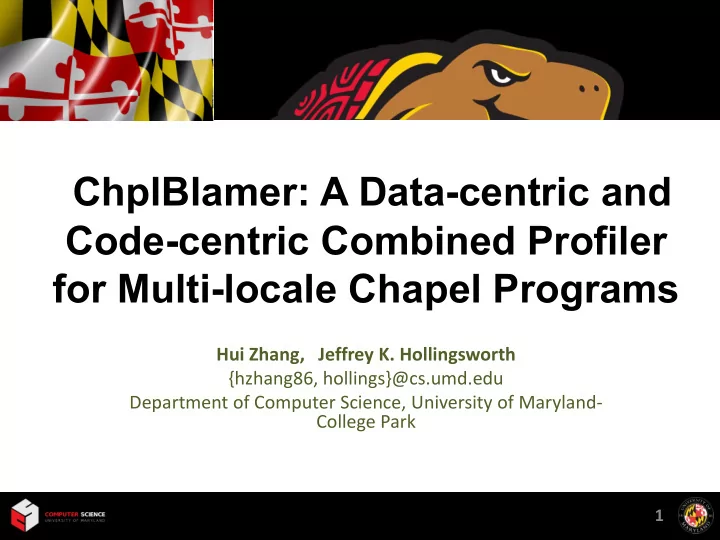

ChplBlamer: A Data-centric and Code-centric Combined Profiler for Multi-locale Chapel Programs Hui Zhang, Jeffrey K. Hollingsworth {hzhang86, hollings}@cs.umd.edu Department of Computer Science, University of Maryland- College Park 1
Multi-locale Chapel Environment 2
Motivation • Why PGAS (Partitioned Global Address Space) Parallel programming is too hard Unified solution for mixed mode parallelism • Why Chapel Chapel is an emerging PGAS language with productive parallel programming features Potential for performance improvement (especially in multi-locale) and few Chapel profilers for its users Insights for evolving the language in the future and the same idea can be applied to other parallel programming paradigms through generic approaches 3
Data-centric Profiling Code-centric Profiling int busy(int *x) { // hotspot function main: 100% main: 100% *x = complex(); busy: 100% busy: 100% return *x; complex: 100% complex: 100% } int main() { Data-centric Profiling for (i=0; i<n; i++) { A[i] = busy(&B[i]) + busy(&C[i-1]) + A: 100% A: 100% busy(&C[i+1]); B: 33.3% B: 33.3% } C: 66.7% C: 66.7% } 4
What is “ChplBlamer”? 5
Properly Assign Blame “I didn’t say you were to blame… I said I am blaming you.” 6
Blame Definition 1) 1) 𝑪𝒎𝒃𝒏𝒇𝑻𝒇𝒖 𝒘 = 𝑪𝒃𝒅𝒍𝒙𝒃𝒔𝒆𝑻𝒎𝒋𝒅𝒇 𝒙 𝒙∈𝑿 2) 2) 𝒋𝒕𝑪𝒎𝒃𝒏𝒇𝒆 𝒘, 𝒕 = {𝒋𝒈 𝒕 ∈ 𝑪𝒎𝒃𝒏𝒇𝑻𝒇𝒖 𝒘 𝒖𝒊𝒇𝒐 𝟐 𝒇𝒎𝒕𝒇 𝟏} 𝒋𝒕𝑪𝒎𝒃𝒏𝒇𝒆(𝒘,𝒕) 3) 3) 𝑪𝒎𝒃𝒏𝒇𝑸𝒇𝒔𝒅𝒇𝒐𝒖𝒃𝒉𝒇 𝒘, 𝑻 = 𝒕∈𝑻 𝑻 • v : a certain variable • w : a write statement to v’s memory region • W : a set of w (all write statements to v’s memory region) • s : a sample • S: a set of samples 7
Blame Calculation 1 a = 8; //Sample 1 2 b = a * a; //Sample 2,3 3 for (i = 0; i < N; i++) //Sample 4 4 b = b + i; 5 c = a + b; //Sample 5 Variable Name a b c i Result Type inc exc inc exc inc exc inc exc BlameSet 1 1 1,2,3,4 2,4 1,2,3,4,5 5 3 3 Blame Samples S1 S1 S1,2,3,4 S2,3 S1,2,3,4,5 S5 S4 S4 Blame 20% 20% 80% 40% 100% 20% 20% 20% 8
ChplBlamer Framework [1] Zhang, Hui, and Jeffrey K. Hollingsworth. "Data Centric Performance Measurement Techniques for Chapel Programs." Parallel and Distributed Processing Symposium (IPDPS), 2017 IEEE International. IEEE, 2017. 9
Multi-locale Challenges • 1 st Challenge: Aggregate blame of many temporary variables that point/refer to the distributed variables through remote data accesses. • Solution : Link variable PvID (privatized id) with different objects accessed through specifc Chapel runtime functions: chpl_getPrivatizedCopy, and chpl_getPrivatizedClass. 10
Multi-locale Challenges • 2 nd Challenge: Recover the hidden data-flow information from Chapel internal module calls, e.g., chpl_gen_comm_get Recover the interrupted data-flow information from Chapel runtime calls, e.g., chpl_ taskListAddBegin • Solution : Conduct simplified blame analysis for Chapel module functions to get data-dependencies between parameters Resolve actual wrapper task function statically through function pointers that were passed to certain Chapel runtime functions 11
Multi-locale Challenges • 3 rd Challenge: Reconstruct the full calling context for each sample and handle asynchronous&remote tasking • Solution : Instrument Chapel tasking and communication layer L og “ task function ID” , “ task sender’s locale ID”, and “task receiver’s locale ID” for each remote task Iteratively glue stacktraces to the current calling context until having the user “ main ” frame 12
New Tool Feature Load Imbalance Check Node information for Ab of HPL on 32 locales 13
Experiment – ISx Data-centric 2-loc 8-loc myBucketedKeys 41.1% 22.9% myKeys 36.9% 20.9% sendOffsets 27.3% 15.4% bucketOffsets 26.9% 15.2% Name original localization barrier 10.3% 20.8% myBucketedKeys 41.11% 17.78% Code-centric 2-loc 8-loc sendOffsets 27.28% 6.02% bucketSort 80.9% 64.2% bucketOffsets 26.85% 5.46% bucketizeLocalKeys 40.2% 22.3% bucketizeLocalKeys 40.24% 24.54% countLocalKeys 11.4% 6.4% pthread_spin_lock 16.7% 29.3% chpl_comm_barrier 0 3.46% 1. Optimize “Barrier” module 2. Apply “local” clause 14
Experiment - LULESH Variable Type Blame Context Elems Struct 74.3% chpl_gen_main elemToNode Struct 60.4% chpl_gen_main xd/yd/zd Struct 48.0% chpl_gen_main x/y/z Struct 37.0% chpl_gen_main fx/fy/fz Struct 35.6% chpl_gen_main dvdx/dvdy/dvdz Struct 33.4% CalcHourglassControlForElems x8n/y8n/z8n Struct 33.3% CalcHourglassControlForElems elemMass Struct 29.5% chpl_gen_main hgfx/hgfy/hgfz Array 26.7% CalcFBHourglassForceForElems shx/shy/shz Double 26.7% CalcElemFBHourglassForce hx/hy/hz Array 26.6% CalcElemFBHourglassForce dxx/dyy/dzz Struct 12.2% CalcLagrangeElements 15
LULESH Optimization: Globalization Problem : Variable Blame Context proc CalcHourglassControlForElems (determ) { Elems 74.3% chpl_gen_main var dvdx, dvdy, dydz, x8n, y8n, z8n: [Elems] 8*real; elemToNode 60.4% chpl_gen_main … xd/yd/zd 48.0% chpl_gen_main Solution: x/y/z 37.0% chpl_gen_main Hoisting distributed local variables to the global fx/fy/fz 35.6% chpl_gen_main space so that they won’t be dynamically dvdx/dvdy/dvdz 33.4% CalcHourglassControlForElems allocated frequently. x8n/y8n/z8n 33.3% CalcHourglassControlForElems Result: elemMass 29.5% chpl_gen_main 30.00 Execution Time (s) 25.00 hgfx/hgfy/hgfz 26.7% CalcFBHourglassForceForElems 20.00 shx/shy/shz 26.7% CalcElemFBHourglassForce Original 15.00 10.00 Globalization hx/hy/hz 26.6% CalcElemFBHourglassForce 5.00 0.00 dxx/dyy/dzz 12.2% CalcLagrangeElements 2 4 8 16 32 #nodes 16
LULESH Optimization: Replication Problem : Variable Blame Context Frequent calls to “ localizeNeighborNodes ” on Elems 74.3% chpl_gen_main these variables which incurs sequential remote elemToNode 60.4% chpl_gen_main data accesses. xd/yd/zd 48.0% chpl_gen_main for i in 1..nodesPerElem x/y/z 37.0% chpl_gen_main { const noi = fx/fy/fz 35.6% chpl_gen_main elemToNode[eli][i]; dvdx/dvdy/dvdz 33.4% CalcHourglassControlForElems x_local[i] = x[noi]; y_local[i] = y[noi]; x8n/y8n/z8n 33.3% CalcHourglassControlForElems z_local[i] = z[noi]; } elemMass 29.5% chpl_gen_main Solution: hgfx/hgfy/hgfz 26.7% CalcFBHourglassForceForElems Allocate global maps to prestore neighboring shx/shy/shz 26.7% CalcElemFBHourglassForce nodes for each element using the same hx/hy/hz 26.6% CalcElemFBHourglassForce domain: var x_map: [Elems] nodesPerElem*real dxx/dyy/dzz 12.2% CalcLagrangeElements 17
Conclusion LULESH 30.00 move from having move from having 25.00 slowdown as more locales slowdown as more locales Original Time (sec) 20.00 4x were added to having were added to having 15.00 Globalization 10.00 speedups! speedups! 5.00 Globalization+Replication 0.00 # nodes 2 4 8 16 32 Data-centric Profiling and Blame Analysis Multi-locale Support and New Features Benchmark Profiling and Optimization 18
Recommend
More recommend